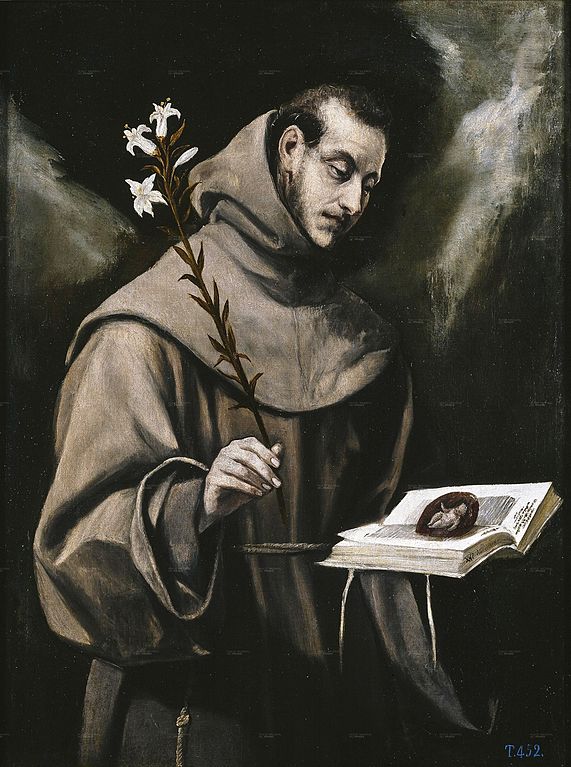 by Theresa Cavicchio
by Theresa CavicchioIt’s fairly common knowledge that Saint Anthony of Padua (1195 – 1231 A.D.) has a reputation as finder of lost articles. Car keys, eyeglasses, and any number of items we consider indispensable, seeming to have disappeared, are catalysts for prayer to the gentle Franciscan and popular saint whose feast we celebrate on June 13th.
As is true of many saints, there is much more to Saint Anthony than meets the eye; in his case, much more than that time-worn rhyme asking him to locate whatever it is we’ve misplaced. This makes it tempting to couch him in a simplistic, sentimental light which hardly does him justice, when in fact, even a cursory study of Saint Anthony’s life reveals that he merited a number of distinguished titles. An overview of several of these follows.
Worker of Miracles Though he died at the young age of 36, Saint Anthony gained renown as a worker of miracles during his brief lifetime. The Little Flowers of St. Francis of Assisi recounts two events in his life that contributed to his widespread reputation for the miraculous, prior to his death and throughout the centuries beyond.
The Little Flowers relates that, having gained a reputation as a gifted, inspirational preacher, Friar Anthony spoke before a papal consistory of prelates representing many different nations and ethnicities. Anthony spoke with such conviction and obvious inspiration of the Holy Spirit “that all those who were in the consistory, even though they spoke different languages, understood what he said as perfectly as if he had spoken the language of each.” This episode, and similar ones recorded elsewhere, recall to us that first powerful speech of the Apostles immediately following the Holy Spirit’s descent at Pentecost (Acts 2:4 – 12).
Another occasion found Anthony in the Italian village of Rimini, where heresies had gripped the populace. Anthony spent several long days preaching there, brilliantly refuting the false beliefs of the time. According to The Little Flowers, “[the heretics] not only resisted his words but became increasingly stubborn and obstinate, refusing to listen to him.”
Undaunted, Anthony went to the seashore and “began to speak to the fishes as if the Lord had sent him to preach to them.” Immediately, numerous fish of various sizes approached, listening in rapt attention as the truths of the faith were preached to them in Anthony’s own inimitable, eloquent way. The effect of this remarkable spectacle, on faithful villagers and heretics alike, was stunning – comfort for the faithful and on-the-spot conversion for heretics.
Hammer of Heretics Like the episode recounted above, the heresies that were common during Anthony’s lifetime formed the basis of his preaching in other locations in Europe. In spirited – and Spirit-inspired – debates, Anthony’s prodigious knowledge of Sacred Scripture demolished heretical arguments. He had studied Scripture and the Church Fathers so thoroughly that he had committed many passages to memory. A gifted orator, he put this knowledge to the best possible use to support the faith and to challenge severely those who would denounce it, earning him the title “Hammer of Heretics.”
Ark of the Testament In a 2010 speech in Rome, Pope (Emeritus) Benedict XVI focused on this “saint who belonged to the first generation of the Friars Minor … one of the most popular Saints in the whole Catholic Church.” The Holy Father listed Saint Anthony’s many “outstanding gifts,” his teaching of theology to Friars Minor at the personal request of Saint Francis, and his persuasive preaching.
The Holy Father continued: “Pope Gregory IX himself, having heard [Anthony] preach, described him as the ‘Ark of the Testament,’ and subsequent to miracles brought about through his intercession canonized him in 1232, only a year after his death.”
Doctor of the Church; Doctor of the Gospel A member of the Franciscan Order for the last eleven years of his life, Saint Anthony left behind a treasure trove: a series of sermons composed for various Sundays and feast days, intended as aids to Franciscan preachers and teachers. Commenting on these writings, Pope Benedict XVI stated: “The richness of spiritual teaching contained in the ‘Sermons’ was so great that in 1946 Venerable Pope Pius XII proclaimed Anthony a Doctor of the Church, attributing to him the title ‘Doctor Evangelicus’ [of the Gospel], since the freshness and beauty of the Gospel emerge from these writings. We can still read them today with great spiritual profit.”
Conclusion In a 1994 speech given on the Feast of Saint Anthony, Saint Pope John Paul II referred to him as “this great disciple of Christ and of the Poverello of Assisi. His preaching, his writings, and above all the holiness of his life also offer the people of our time living and inspiring guidelines for the necessary commitment to the new evangelization.”
Several decades later, these words of Saint Pope John Paul remain relevant; in fact, perhaps even more so today. Our “necessary commitment to the new evangelization” must be strong and resilient if we are to defend the faith in our own time, especially by the witness of our daily lives. For guidance in this effort, we turn to the best of role models.
The saint who was known to be understood in many unknown foreign tongues left us this counsel: “The man who is filled with the Holy Spirit speaks in different languages. These different languages are different ways of witnessing to Christ, such as humility, poverty, patience and obedience; we speak in those languages when we reveal in ourselves these virtues to others. Actions speak louder than words; let your words teach and your actions speak” (Sermons of Saint Anthony, Sermon I, 226).
© All Rights Reserved, Living His Life Abundantly®/Women of Grace® http://www.womenofgrace.com
